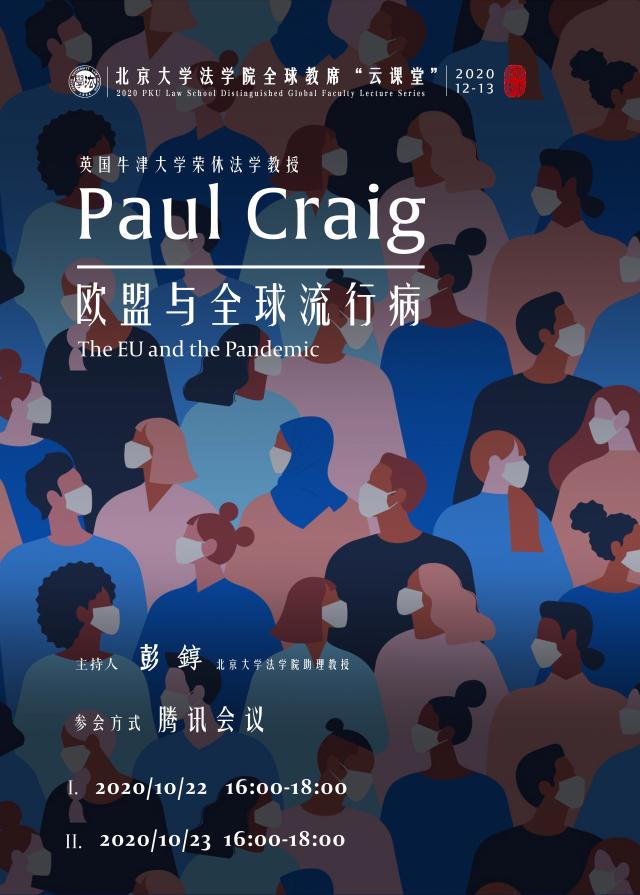全球教席“云课堂”12-13讲
12讲:
题目:欧盟与全球流行病(一)
The EU and the Pandemic (Ⅰ)
时间:2020 年 10 月 22 日(周四)16:00-18:00
腾讯会议 ID:603 791 582
13讲:
题目:欧盟与全球流行病(二)
The EU and the Pandemic (Ⅱ)
时间:2020 年 10 月 23 日(周五)16:00-18:00
腾讯会议 ID:652 822 197
开讲学者:
Paul Craig
英国牛津大学荣休法学教授
主持人:
彭錞
3354cc金沙集团助理教授
开讲学者简介:
Paul Craig 是享誉全球的行政法和欧盟法专家。他拥有牛津大学伍斯特学院法学本科及硕士学位,曾在牛津大学教授宪法课程,也曾在印第安纳大学伯明顿分校和墨尔本大学开设行政法、欧盟法相关课程。
Paul Craig is the Emeritus Professor of English Law at the University of Oxford. Craig is a specialist in Administrative and EU Law. He was educated at Worcester College, Oxford, where he took his MA and BCL. He stayed at Worcester, and was made a Fellow in 1976. He is the author of a number of legal textbooks, the most well-known of which (EU Law: Text, Cases and Materials) was published in its 5th edition by Oxford University Press in September 2011. Some of his other publications include The Lisbon Treaty: Law, Politics and Treaty Reform, and EU Administrative Law. He lectured in Constitutional Law at the University of Oxford, taught Administrative Law and European Union Law at Indiana University - Bloomington, and a Masters Course at the University of Melbourne, Australia.
摘要:
当新冠肺炎疫情演变为一场全球大流行病,没有哪个国家可以独善其身,国家间的合作是唯一的应对之道。作为区域国际合作常态化、制度化的重要成果,欧盟在应对疫情过程中采取了一系列措施,包括提出卫生健康方面的倡议、设立支持各成员国医疗系统的欧盟基金,以及提升个人防护用品的产量。为缓解疫情的经济影响,欧盟也在经济层面作出应对,比如向企业提供援助,并建立欧洲经济稳定性机制来帮助受疫情影响最大的成员国。这些努力都有成效,但仍有不足。因此,欧盟还需进一步改革,以增强有效应对突发公共卫生事件的能力。除效率之外,欧盟在这场危机中所采取的措施还遭遇了合法性疑问。所以,欧盟必须在其法定权限范围和各成员国愿意接受的政治边界内行动。
我们之所以关心欧盟,是出于对主权国家之间更深层次合作如何可能的关切。今天,无论中西方,都面临越来越多需要国际合作、携手应对的全球性危机与挑战,新冠肺炎疫情仅仅只是其中之一。在此意义上,有必要深入理解欧盟应对疫情之得与失。
When the spread of COVID-19 was recognized as a pandemic, no single nation could be prepared if other nations remain unprepared. Cooperation between countries is the only right choice. As a normalized and institutionalized existence of such regional cooperation, the EU made efforts in several areas ranging from health to macro-economy. There were numerous EU health initiative, such as EU funding to support the healthcare systems of EU countries and measures to increase production of personal protective equipment. There were economic initiatives, such as temporary state aid rules so that governments could provide assistance to firms, and the European Stability Mechanism (ESM) for Member States most affected by the pandemic. These efforts have been effective but still seem insufficient. Therefore, further reforms to make the EU more adaptable to public health emergencies should be on the agenda. In addition to effectiveness, the EU’s actions during the crisis may also encounter the problem of legitimacy. Thus, the EU must act within the limits of its competence, and within the political constraints of what Member States are willing to accept.
In a sense, we care about the EU because of our concerns over the possibility of deeper cooperation between sovereign states. Today we’re facing an increasing number of global crises and challenges that require cooperation between countries, and the COVID-19 pandemic is just one of them. In this light, it is ever more important to understand the successes and lessons of the EU coping with the pandemic.

对外事务办公室
2020年10月18日
